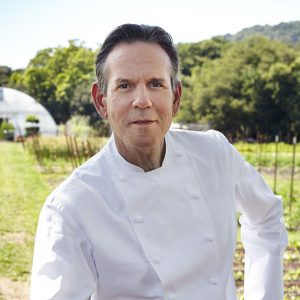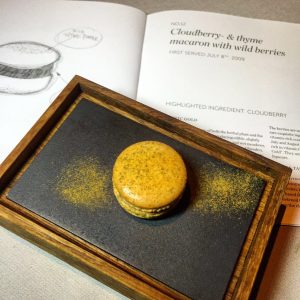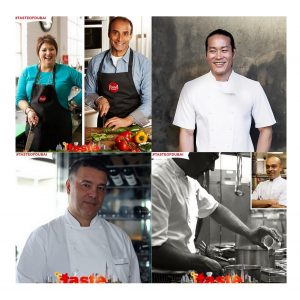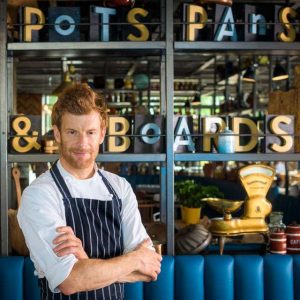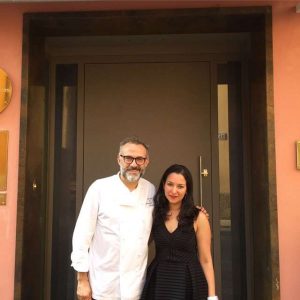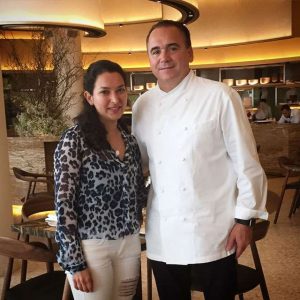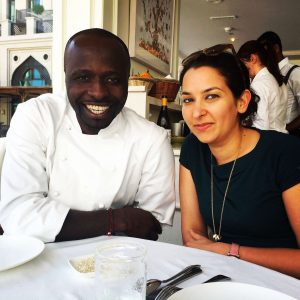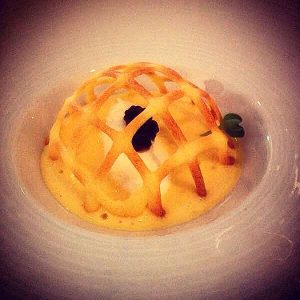A chat with Chef Vineet Bhatia
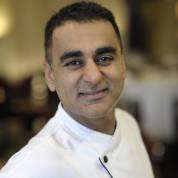

 I have been to Chef Vineet Bhatia's restaurants around the world, including Geneva, London and Dubai, and have always enjoyed them. Indego at the Grosvenor House in particular has been a regular spot for family dinners over the years. My interview with Chef Vineet was long overdue so I was happy that we finally had the chance to sit down and have a proper chat!
I have been to Chef Vineet Bhatia's restaurants around the world, including Geneva, London and Dubai, and have always enjoyed them. Indego at the Grosvenor House in particular has been a regular spot for family dinners over the years. My interview with Chef Vineet was long overdue so I was happy that we finally had the chance to sit down and have a proper chat!
Sumati: Have you ever been interviewed from a vegetarian perspective?
Chef Vineet: Well, I have lots of vegetarian customers, but I'm pretty sure you are the first vegetarian that has interviewed me!
Sumati: You wanted to be an Air Force pilot when growing up. How did you transition to food from there?
Chef Vineet: When I was growing up in Mumbai, we used to live by the aerodrome in Juhu. My brother and I would cycle to school every day and pass by the aircraft there every day. It was the early 70’s and in those days there were no barriers to prevent access, so we could literally walk in whenever we wanted. My love of engineered aircraft made me want to become a pilot. I applied to the NDA (National Defense Academy) when I was 17 and passed all my exams but they didn't clear me for flight because my legs were too short. They offered me the army or navy instead, but I refused.
At around the same time, I developed an interest in bartending, so when I got a call for hotel management, it sounded interesting. The movie Cocktail, with Tom Cruise, had come out at the time, and it looked like a great job! I interviewed for an internship at The Oberoi, and when I told them I wanted to work at the bar, they offered me the kitchen instead. Apparently, I was too short to reach the top of the counter!
I was eager to get into the field, so I accepted their offer, although I hated the idea of working in the kitchen. I hoped it would help me transition to something more customer-focused. Once I started, I was absolutely amazed at the amount of discipline involved; the professionalism, the training techniques, and how articulate they were when dealing with the staff. That’s where I found my passion for cooking.
Sumati: What sort of vegetarian dishes did you grow up with?
Chef Vineet: We had very simple food at home. Nothing special or fancy. I actually wasn’t fond of vegetarian food when I was young, or any food other than sweets. Anything with sugar in it would keep me happy!
But now, as my wife is vegetarian, I eat a lot of vegetarian food at home. We both cook, and usually keep it simple; I have a lot of dal chawal (rice and dal). If I’m traveling, I make something that will last her for a few days so she can just work without having to worry about that. But she makes the best phulkas and yellow dal!
Sumati: Did you start out as a traditionalist in terms of cooking, or were you always interested in expanding the boundaries of Indian cuisine?
Chef Vineet: I started out with traditional food, but evolved by default. When I first moved to London from India in ’93, the first dish I made was gajar ka halwa (warm carrot pudding), but it was sent back by the guest! I was shocked by this and asked him what the problem was. He said that gajar ka halwa is supposed to be served chilled, shaped like a cube on a plate. And I thought, “What kind of gajar ka halwa is that?” That’s what restaurants used to buy from stores and just serve straight from refrigerator, and people thought it was authentic food!
I realized then that I had to do things differently. If I made gajar ka halwa and described it in a exotic and different way, they would eat it. But if I just called it gajar ka halwa, they wouldn’t like it. All the other Indian restaurants designed their food to suit English tastes; it was not proper Indian food. So I rebelled against that standard.

Goats cheese samosa with lentil soup, sun-dried tomatoes and olives
Sumati: How has your cooking evolved over the years?
Chef Vineet: I did classic dishes in the early days. Over time, it began to be prepared and plated differently as the cuisine evolved. I was probably the first person to do an Indian tasting menu back in ’95 or ’96 and it was unheard of. My boss at the time thought I was crazy. He said nobody would go for a 7-course or a 9-course meal, but I was confident that the concept would catch on gradually. Now, if you go to any Indian restaurant of any caliber, they’ll have a regular and vegetarian tasting menu. You’ve just got to start the fire.
Sumati: What proportion of your guests would you consider to be vegetarian?
Chef Vineet: The majority of my Indian guests are vegetarian, but vegetarianism is a growing trend with non-Indians as well. At Indego, I would say that about 30 percent of the guests are vegetarian. At Ashiana at the Dubai Creek, it's closer 50 or 60 percent. Thus the menus also vary based on this.

Pumpkin shish kebab with zuchini pancakes, dill and onion raita and mango chutney
Sumati: How would you describe the concept of your Dubai restaurants?
Chef Vineet: I would describe it as evolved Indian food. We don’t use much molecular gastronomy at all. It’s creative cuisine. We use some modern techniques, which you have to when you are in this line, but it doesn’t dictate our style. Indian cuisine has enough to create a good repertoire. I’m basically from the old school of cooking. I embrace modern techniques and style, but I’m quite old-fashioned.
Sumati: What is the major difference in cooking for the Dubai palate versus the UK palate?
Chef Vineet: The client base is the main consideration. There’s a different sort of clientele here than in London or in Geneva. For example, the portions are much larger here as compared to Geneva. Even between here and Ashiana we’re catering for a slightly different audience.
Sumati: What are some of your favorite vegetarian dishes from any of your restaurants?
Chef Vineet: My favorite dish at Indego is Saag Gulab Jamun. We’ve had it for a year now, and I love making it, and eating it too. Aside from that, you can’t go wrong with a chaat. We have a chaat platter here with a dahi vada ice cream that’s been around for 2 years. Chocolate samosas are one of our oldest dishes, and now many Indian restaurants are making them.
Sumati: I believe you’ve also consulted on the Business Class menu for Qatar Airways. What factors did you consider when creating the vegetarian options?
Chef Vineet: I actually started with the British Airways Concorde in 2001. They invited me to sample some of their dishes, thus they gave me a selection of Chinese, Italian and French dishes. When I asked them to show me their Indian options were, they got me things like spinach and eggplant fritters, but they were served cold! For the prices that someone would be paying for that flight, they certainly deserved better food!
They gave me carte blanche and put my name on the menu. When Concorde shut down one year later, we were put on the Jumbo jets. Prior to that, they were using jars of store-bought sauce and mixing them with vegetables. I took over and worked there for 10 years. At the end of my tenure, 10 out of 14 passengers said they would eat Indian food!
After that, I moved to Qatar Airways, which has been ongoing for four years now. We recently did a workshop focusing on vegetarian dishes. There is a lot of demand now, as a lot of passengers flying to Qatar are Indian, and a lot of Westerners are also converting to vegetarianism. It’s a lot lighter on a long flight. With vegetarian food, you feel less heavy and don’t feel as jet lagged.
Sumati: I’m sure that was a major turning point in your career. What was your big break?
Chef Vineet: My big break was when I got a Michelin star back in 2001. When I first received a call from The New York Times early in the morning on the 21st of January, I thought it was a prank so I hung up! Then they called back again and told me that I was the first Indian chef to have ever received a Michelin star. I have no idea how they even got my home number. My wife was with me at the time, and neither of us could believe it and we weren't even aiming for it, so it was a really pleasant surprise! When we got to the restaurant the phone was ringing off the hook with people asking me for interviews, photo shoots, etc. But I turned them all down because I had a family holiday planned for my son's 1st birthday and there was no way I was cancelling that. My partners thought I was crazy to turn away all the publicity, but I didn't care as my family was more important.
People say I could have gone a lot further had I focused more on publicity, but I don't care as money is not what drives me. I have seen days where I haven't had enough money to feed my child, but now I have more than I need. What drives me is the challenge to create a new concept or push the boundaries. And of course how much you give back to the community, thats what counts.
Sumati: Food wastage is a major topic of discussion nowadays. How do you address that problem?
Chef Vineet: There is very little waste in the restaurant. Waste adds to our costs, so it makes sense to minimize it from a financial perspective as well as a social one. If there is any food that we feel will not be utilized or consumed, we offer it to our guests free of charge or give it to staff, so it won’t have to be thrown away.
Sumati: Who are some of your favorite chefs making Indian vegetarian food?
Chef Vineet: The chefs at Dum Pukht in Delhi make some great vegetarian food, especially stuffed dumplings. They do the royal cuisine of Awadh, which is predominantly non-veg, but they do some very good vegetarian food.
Sumati: What are your favorite restaurants in Dubai?
 Chef Vineet: I don’t get much time to go out and eat, unfortunately, as I spend so much time traveling and working. When I do eat at a restaurant, it’s at the hotel where I’m staying. The Buddha Bar here at Grosvenor House is my favorite. For Indian food, I like Saravana Bhavan, especially their dosas. I love South Indian food.
Chef Vineet: I don’t get much time to go out and eat, unfortunately, as I spend so much time traveling and working. When I do eat at a restaurant, it’s at the hotel where I’m staying. The Buddha Bar here at Grosvenor House is my favorite. For Indian food, I like Saravana Bhavan, especially their dosas. I love South Indian food.
Sumati: What ingredients can you not do without?
Chef Vineet: I have to have rice in my pantry. As for spices, I always keep jeera, ajwain, coriander, cloves and cardamom. For me, these are essentials.
Chef Vineet is an inspiring success story of someone who started off with nothing, rebelled against existing norms and proved that hard work and passion is the real "recipe" for success.
Sumati Menda
NEWSLETTER SIGNUP
Never miss a post from VeggieBuzz!
Sign up for our newsletter to get the latest VeggieBuzz content delivered right to your inbox.





